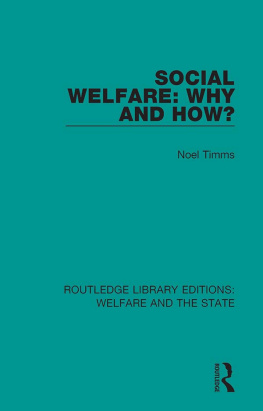ROUTLEDGE LIBRARY EDITIONS:
SOCIAL THEORY
Volume 69
A SOCIOLOGICAL APPROACH TO
SOCIAL PROBLEMS
First published in 1967
This edition first published in 2015
by Routledge
2 Park Square, Milton Park, Abingdon, Oxon, OX14 4RN
and by Routledge
711 Third Avenue, New York, NY 10017
Routledge is an imprint of the Taylor & Francis Group, an informa business
1967 Noel Timms
All rights reserved. No part of this book may be reprinted or reproduced or utilised in any form or by any electronic, mechanical, or other means, now known or hereafter invented, including photocopying and recording, or in any information storage or retrieval system, without permission in writing from the publishers.
Trademark notice: Product or corporate names may be trademarks or registered trademarks, and are used only for identification and explanation without intent to infringe.
British Library Cataloguing in Publication Data
A catalogue record for this book is available from the British Library
ISBN: 978-0-415-72731-0 (Set)
eISBN: 978-1-315-76997-4 (Set)
ISBN: 978-1-138-78802-2 (Volume 69)
eISBN: 978-1-315-76335-4 (Volume 69)
Publishers Note
The publisher has gone to great lengths to ensure the quality of this reprint but points out that some imperfections in the original copies may be apparent.
Disclaimer
The publisher has made every effort to trace copyright holders and would welcome correspondence from those they have been unable to trace.
First published 1967
by Routledge and Kegan Paul Ltd
Broadway House, 68-74 Carter Lane
London, E.C.4
Printed in Great Britain
by Bookprint Limited
Crawley, Sussex
Noel Timms 1967
No part of this book may be reproduced
in any form without permission from
the publisher, except for the quotation
of brief passages in criticism
Today Sociology is going through a phase of great expansion. Not only is there a widespread general interest in the subject, but there is a rapid growth in the number of new courses at Universities, Training Colleges, and elsewhere. As a result there is an increasing number of potential readers of introductory textbooks. Some will be motivated by general interest; some will want to find out enough about the subject to see whether they would like to pursue a formal course in it; and others will already be following courses into which an element of Sociology has been fused. One approach to these readers is by means of the comprehensive introductory volume giving a general coverage of the field of sociology; another is by means of a series of monographs each providing an introduction to a selected topic. Both these approaches have their advantages and disadvantages. The Students Library of Sociology adopts the second approach. It will cover a more extensive range of topics than could be dealt with in a single volume; while at the same time each volume will provide a thorough introductory treatment of any one topic. The reader who has little or no knowledge in the field will find within any particular book a foundation upon which to build, and to extend by means of the suggestions for further reading.
In this volume Mr. Timms explores a field which is much more complex than might appear from its title. Firstly, it is necessary to consider what constitutes a social problem. If asked to make a list of social problems no doubt most people would include crime, and possibly poverty and no doubt some would include racism, but probably not many would include war. Yet it could be argued that the implications of the last are of at least equal importance for society to those of the previous ones. Is there any way of defining a social problem which will be theoretically meaningful? In other words, must we simply accept as social problems those areas of social behaviour which as a matter of fact have been treated as such or can we find some means of understanding certain types of social behaviour in terms of our understanding of the way social systems work?
This leads directly in to another set of considerations. For if some means can be found of understanding social problems in the sense I have suggested, this would constitute a sociological approach to their study. The topics covered in this book are directly related to much of the misunderstanding of what sociology is about. It is usual nowadays to label as sociological any discussion concerned, however loosely, with Society. But a careful reading of Mr. Timms treatment of the problem areas he has chosen should make clear the difference between this use of the adjective in everyday speech, and its more vigorous technical usage.
In dealing with his subject Mr. Timms makes use of the concepts of sociology such as role, norms, social control, class, and family. These concepts are dealt with in other volumes in the series and reference should be made to them.
A. R. EMERSON
Contents
Definitions have their place, and this is, more often than not, at the conclusion rather than the beginning of a study. Yet the attempt to make a sociological approach to social problems involves us at the outset in problems of definition of two distinct kinds. An approach that is decisively sociological needs to be identified among the increasing number of viewpoints that are described by that name, and to be distinguished from the contributions that can be expected from the neighbouring discipline of psychology and the field of study known as social administration. We also need to consider the part played by the process of social definition in the delineation of certain aspects of social life as problems. In other words, we are raising in terms of definition two important kinds of question: Are social problems simply ways of referring to aggregates of deviant individuals? Are these problems purely those evils that a society at a particular time defines as a social problem by taking a variety of measures to cure or prevent it?
The adjective social is now used in connection with such a very wide variety of subjects that it is nearly drained of meaning. The same could almost be said of sociology. On television, for example, any investigation, however slight, into peoples habits, any report of their spontaneous replies to scarcely formulated questions is classed as sociological. Durkheims words in regard to the misuse of the term social are as relevant today as they were at the end of the last century: he observed that it is currently employed for practically all phenomena generally diffused within a society, however small their social interest. But on this basis there are, as it were, no human events that may not be called social (Durkheim, 1894). The attempt to remedy this situation, and to anchor the social and the sociological more securely faces the fact that sociologists themselves are divided on a number of key issues. Is the sociologist primarily concerned with the investigation of social problems with a view to finding solutions, or with the investigation of problems relevant to the testing of hypotheses deduced from gradually developing theories about society? Does the sociologist aim at investigating society as the natural scientist studies non-human phenomena, or should he hope to understand the views and ideas of those who participate in any particular social system? Is sociology a profession or a discipline? As a professional the sociologist would be seen as someone trained in the methods which alone equip people to study sociological problems, but if sociology is seen as a discipline then reference is to the study of society by any appropriate method, and the methods are open to anyone provided they can use them effectively.



